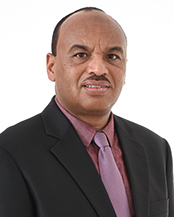The Team
 Dr. Tarig Ali, Director
Dr. Tarig Ali, Director
Dr. Ali holds a Bachelor of Science (honors) in Civil Engineering from Khartoum University, and MS and PhD degrees in the area of geoinformation and geodetic engineering from The Ohio State University (OSU). While at OSU, Dr. Ali was with the Mapping & GIS Lab and OSU’s Center for Mapping. He taught at East Tennessee State University (ETSU) and the University of Central Florida (UCF) from 2003 to 2009 before joining AUS. Also, Dr. Ali was a “physical scientist” at NOAA’s Great Lakes Environmental Research Labs in Ann Arbor, Michigan, USA in 2000. At ETSU, Dr. Ali helped in developing a new “GIS and Mapping” track in the Bachelor of Science in Surveying and Mapping Science program, and in establishing a new GIS and Remote Sensing Laboratory and a CORS station. At UCF, he developed a new concentration in geomatics within the Bachelor of Science in Engineering Technology program. At AUS, Dr. Ali developed and taught the first GIS course, CVE 472 Geographic Information Systems, and the first remote sensing course, CVE 572 Satellite Remote Sensing. Dr. Ali received an ESRI Award for the Best Scientific Paper in GIS in 2006, the ETSU Faculty Excellence Award in 2005, the American Shore and Beach Preservation Association's Murrough O'Brien Education Award in 2004, and The Ohio State University's Duane Brown Junior Award in 2003. Dr. Ali's research interests include coastal mapping, terrain modeling, wide-area GPS networks, and applications of GIS and remote sensing in environmental and transportation engineering.
Dr. Rabin Chakrabortty
Dr. Rabin Chakrabortty is an accomplished academic researcher specializing in remote sensing, with extensive experience in environmental hazards, climate change and geospatial data analysis. He holds a PhD in Applied Geomorphology from the University of Burdwan, West Bengal, India, where he also completed his graduate and undergraduate degrees in geography, with a specialization in environmental issues. Dr. Chakrabortty’s research primarily revolves around natural hazards, including soil erosion, landslides and floods, as well as climate change and its implications for the environment. He is currently a Postdoctoral Fellow at the AUS Department of Civil Engineering. Before this, he worked at the Asian Institute of Technology, Thailand, as a Postdoctoral Fellow, and served as a GIS expert for various environmental impact assessments, including the Impact Evaluation of the REWARD Program in Odisha funded by the World Bank. His postdoctoral work focuses on advancing research in geospatial analysis, climate impact assessment and environmental data science. His doctoral research, titled "Assessment of Soil Erosion in the Catchment Area and its Impact on Reservoir Sedimentation in the Kangsabati River," contributed significantly to understanding the environmental challenges in Indian river basins. He has also worked extensively as a Junior Research Fellow in various state and national projects, including those funded by the Department of Science and Technology and the Indian Council of Social Science Research by the Government of India. Dr. Chakrabortty’s research has earned him a place among the top 2 percent of scientists worldwide, as ranked by Stanford University in the field of geomatics engineering. This prestigious distinction reflects his high-impact contributions in the fields of geomorphology, environmental science and climate change research. Dr. Chakrabortty was an invited speaker at the16th Conference of the Parties (COP16) to the United Nations Convention to Combat Desertification (UNCCD) in Riyadh, Saudi Arabia, held December 2–13, 2024. This conference marked the 30th anniversary of the UNCCD and was the first hosted in the Middle East. It brought together representatives from 196 countries and the European Union to address land degradation, drought resilience and sustainable land management. His substantial body of work includes over 100 peer-reviewed journal articles, several book chapters and an edited book. His research is widely cited in leading journals, with a focus on environmental hazards, geospatial technologies and climate change. He is known for his active collaboration with leading researchers and institutions worldwide, which has resulted in several high-impact publications and research partnerships that advance the field of environmental science on a global scale.
Dr. Gowhar Meraj
Dr. Gowhar Meraj is a recipient of the prestigious JSPS Post-Doctoral Fellowship awarded by the Government of Japan and was affiliated under this fellowship with the Department of Ecosystem Studies at The University of Tokyo, Japan, a globally renowned institution consistently ranked among the top 30 universities worldwide. He previously served as a Principal Investigator and Young Scientist Fellow under the Government of India’s Scheme for Young Scientists and Technologists (SYST). Additionally, he worked for five years as a Programme Officer in the Environmental Information Systems (ENVIS), a flagship environmental coordination and awareness initiative of the Government of India. Dr. Meraj holds a PhD in Environmental Sciences with a specialization in climate change and water resources. His extensive research spans land system changes, hydrology, river basin management, disaster risk assessment, remote sensing, GIS and spatial analysis. He is actively collaborating with researchers from Japan, Saudi Arabia, Bangladesh, Vietnam, Italy, Turkey, Mongolia, Australia, the United States and India, contributing significantly to global efforts in water security and environmental sustainability. With over 100 research publications in esteemed international journals, Dr. Meraj’s work is widely recognized for advancing critical solutions to challenges in sustainability science, ecosystem restoration, water resources and environmental resilience.

